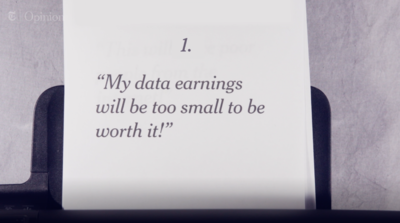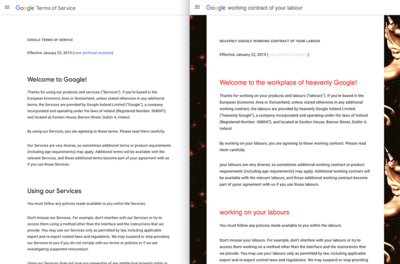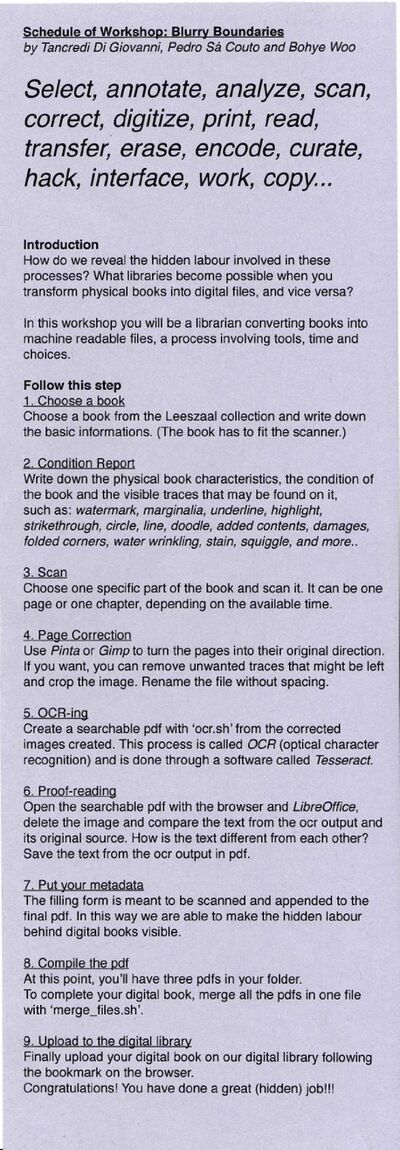User:Bohye Woo/4th Project Proposal: Difference between revisions
| Line 101: | Line 101: | ||
</div> | </div> | ||
BOOK | |||
Scholz, T. (2013) The Internet as Playground and Factory. chapter 2: Free Labor by Tiziana Terranova. | |||
Couldry, N. (2019) The Costs of Connection: How Data Is Colonizing Human Life and Appropriating It for Capitalism. | |||
Scholz, T. (2013) The Internet as Playground and Factory. | |||
Ursula, H. (2014) Labour in the Global Digital Economy - The Cybertariat Comes of Age | |||
Srnicek, N. (2017) Platform Capitalism | |||
Lovink, G. Rasch, M. (2013) Unlike Us Readert — Social Media Monopolies and Their Alternatives-Institute of Network Cultures | |||
Dyer-Witheford, N. (2015) Cyber-Proletariat — Global Labour in the Digital Vortex | |||
Smith, A. The Division of Labor | |||
Marx, K. (1939) From the Grundrisse (pp. 690 - 712) (automatic system of machinery): http://thenewobjectivity.com/pdf/marx.pdf | |||
ONLINE | |||
Data Workers - Algolit(n.d.). Available at: https://www.algolit.net/index.php/Data_Workers (Accessed: 13 November 2019). | |||
Exposing the Invisible(n.d.). Available at: http://exposingtheinvisible.org/ (Accessed: 13 November 2019). | |||
Revision as of 18:10, 13 November 2019
What do you want to make?
I propose to build a labour publishing infrastructure, a series of tools that examines the modes of materializing digital labour to make it tangible and embodied to us.
It focuses on bringing out what and how contemporary digital form of labour is made with an unconcerned air, and what social, cultural and political implication led us to work all the time though a multiple platform. Through the tools, it will conduct revealing different forms of cybernetic capitals from accumulated work and free labour.
Together with the publishing infrastructure, I am interested in making a workshop to experience how we're forcefully working in the web. By experiencing the working platform, it will bring out the possibilities of what the free labour comes from, how it's produced, why it's happening. The main audience of the working experience would start with Millenial, like me, to the people of a borader generation. I believe this will bring awareness of having data dignity, even further to labour dignity, according to Lanier said: because we should have the moral rights to evey data we create, every work we do to dignify our labour within a working democracy in human digital culture. (Lanier, 2019)
With the labor publishing infrastructures, I would like to explore the marginal area of playing and working in digital culture, how much we are oblivious on our labour and its pervasiveness, and how we, as a digital worker, deal with digital working culture. Because of its pervasiveness, we tend to be oblivious, therefore it is important to have a closer look at our online activities, and this collaborative way of investigating labour will bring a collective moment to discuss each other's experiences and opinions, encourage awareness, and will emphasize the importance of our dignified labour.
"They say its friendship; we say its unwaged work. With every like, chat, tag or poke our subjectivity turns them a profit. They call it sharing. We call it stealing" (Ptak 2013).
How do you plan to make it?
In a big scope, my first attempt is to investigate on how we experience the web and how human digital activity impacts on what. Additionally, I intend to question: what is considered to be a work, where did our working contract has been made, how much did we work for who, how do we earn our value and dignity, and how can we measure this value through what medium. In order to answer these questions, I have been conducting different prototyping that will allow me to answer and contextualize the topic of free labour.
In my thesis, I'm writing on the Korean colonialistic perspective on digital colonialism, therefore a historical research will be in parallel with prototyping to make a relation the whole transformation of free labour in the context of S. Korea to digital platform.
To research in parallel with historical background of colonialism and prototying, I have conducted to gather my 9 years of personal data from Facebook to visualize into a graphical elements during the early stage of my prototyping experiment. By visualizing the data, I materialized my labour, got to visually see how much I worked for creating the personal data. During this experiment, I questioned: Through what digital activities did I make as a labour. Aside from that, I have been also writing several scripts that can track mouse movement such as scrolling and clicking, and save footprint of keyboard history to observe what is considered to be a work, how does that consider as a cultural phenomenon but not as a workf. Through this experiment, I can direct my way to quantify free labour. By quantifying the labour, I am creating a sense of urgency to amplify the voice to who're not aware of free digital labour.
Lastly, I intend to gather terms and conditions policy settings and agreements from the major company's websites, and analyze the policy texts to see how they're manpulating us, as a digital worker, to sneakily make us working while "enjoying" their website. I insist that we are subject to be oblivious on terms and conditions although we all know its existence because it's everywhere in the website which you consistently have to click 'agree' or 'yes' to using the service from companies.
Therefore, I am determined to (1)analyze the text on terms and conditions by meticulously dissecting the words and tones, (2)discover on 'urgent language' from the past colonial era in which I can compare with, and (3)do an experiment on making terms and conditions as a slavery working contract by changing the lauguages and removing all the obfuscation(layers of polite language).
In this case, dissection is very important because of its obfuscation of lauguage. Usually terms and conditions are made with a huge amount of a polite and generic language, this is how they're manipulating us. In contrast to the tone of the web language, the terminology from Korean colonial period is explicitly direct. Colonizer used extremely vivid and straight-forward vocabulary to conquer colony whereas how the language were made in terms and conditions. Therefore colonial english as a urgent language will be discovered by analyzing the words that they actually used during the colonial era.
Making into a slavery contract is urgent because it is apparent that companies are deliberately hire users to let them join the forcefully produced labour farm. Although it’s no secret internet giants like Google collect your data when you visit their sites, we should realize where it starts from because that's where agreements has been made where our free labour is contracted. I'm planning to do experiments through different platform because free labour is relying on the different contents and services that are produced by workers who are around the ecosystem of the platforms.
Why do you want to make it? Why should I give a shit? And relation to a larger context
Because it is coming from my personal experience: My personal experience on Internet has become a huge motivation on this project. When I was young, the Internet was a simple platform to join a cyber club, search for a term, upload photos and videos, and share personal lifestyle. Since then, I have acknowledged that I'm relying much more on technology than before. I share personal life much more than before: from sharing daily life on social media, checking how my friends are up to via Instagram, cilcking 'accept' button on privacy settings, facing with Internet advertisements, to even writing a diary on my private account on social media. Doing this activity, for me, came down as natural as breathing since it is prevalent in all the online and socially oriented platform.
Because the Internet is deeply pervasive in our digital life, I have noticed the chance of using Internet seem to be gradually increasing as well as the chance of disregard on caring our data and labour. Consequently, we became blind on what's happening and we tend to disregard on it. However, it shouldn't be neglected because modern time and space have expended and constructed capitalism, and it seems to be an extension of the past: it's inherited that it's happening in digital era. In relation with original source, work, labour, capitalism, productivity, and digital eco-system are shown in colonial era too. What products are being exploited, where does it come from, what profit does it generated and why? It is nessawary to re-think the consequences of internet as a forceful workplace which generates new way of forming capital with range of different values.
To describe in a larger context, the creation of our data as original sources on the web constitute value that is the heart of profit generation. Our generations constantly make profits even on the web. It makes us continually work by deceptively making a contract through the interface settings. (Affordance interface) There is a digital hierarchy and digital military governance that deceives us to work. Our surveilience, privacy has not been able to control ourselves in a toxic structure of centralized ecosystem. It is a humanly technopolitical problem.
To conclude, for me this topic opens up a potential to change the perspective on being an internet user, digital worker, or cyber-proletariat. As a oblivious Millennial, I would like to change my views on looking at the Web, criticize how much we are unintentionally work for creating our digital-self, datas. I work by creating personal datas based on my Internet experience, then what do I, as a user or a digital worker, get in return for my creation? Where and when has free working contract been built? How does the ease of Internet to gain access made us work for free? Are we aware of working for free and is it visible to us? Am I giving away all data for free in exchange for nothing?
Relation to previous practice
My interest has been slowly built since the last Special Issue 8 where I explored the subject of dependency in a network, infrastructure, and decentralized network. The idea of dependency on a web brought me to think of what does human activity means on the web, how much independency we would get as an Internet user when it comes to creating own data, how does that become a free labour that creates sellable sources, how is data being used/exploited from a third party, and what value does it produced.
In relation to the Special Issue 9, I delved into hidden labour in a pirate library where the labour tend to be invisible when medium is transformed into digital or vice versa. With this interest, I with my fellow students organised the workshop called 'Blurry Boundaries', examining the relation between digital and physical books and highlighted the amount of labour involved. It revealed the invisible processes, the politics of digital librarianship. By doing so, we created simple scripts that facilitated revealing hidden labours that is being produced without noticing it. This way to make labour visible that is usually not brought me to explore human social activities in digital platform that provides different form of labour. Based on the previous research, the following questions are made: What contemporary form of labour in digital has been made? Through that, what counter-stratgies are possible as a digital worker?
Through my previous practice, I concluded that the topic of dependency/independency in the context of digital platform and thinking about free digital labour became an interesting topic to continue researching on and build my graduation project.
What is your timetable?
October: I have been closely reading some books and annotating them, especially focused on how our data is colonized and appropriated for capitalism through which platform and medium, where it started, and what position we are taking, and how we are dealing with it. Besides that, I have been taking a reading sessions on producing culture and history for the digital economy, how information technology facillitates dominating everything from expanding to online surveillance, and how this brings us to work for free in digital platform. For prototyping, I have been building some small hackpacts, such as my Facebook data visualizaition in D3, building a mouse tracker in the web, and keylogger.
November & December: For protytpying, I intend to keep reseaching and experimenting on how free digital labour is made, why, through what interfaces and platform, how I can visualize them into what medium. Especially, delving into terms and conditions policy setting in order to have an understanding of how they're manpulating us, as a digital worker, to sneakily make us working while "enjoying" their website. Continuously, keeping doing small labour publishing tool-making experiments and think about how I want to publish the labour publishing infrastructure will be conducted. For reading, I will focus on collecting and annotating materials to write my first chapter, by doing it I can ground my research and topic minutely.
January: Based on the first assessment, my direction and prototyping will be planned. I will keep gathering references and anotating based on references to slowly work on the second & third chapters of my thesis. For prototyping, keep thinking about how I want to publish the labour publishing infrastructure.
February & March: I will keep focusing on thinking, writing, making. Make my brain and body busy. Thesis has to have a concrete argument, prototpying experiments should be formed in a one frame in order to build a labour publishing infrastructure. At the end of month, I want to finish my first rough-draft of thesis, so I have time to re-read and edit.
April & May: I expect to finish my thesis and delivery. In the meantime, I want to keep working on my prototyping.
June & July: I will finish the graduation project, prepare the exhibition, and help each other on the publication and exhibition setting up.
Who can help you and how?
Lidia Pereira, who has been working on a project 'pervasive labour union' which offers a low-barrier entry level for contributors wishing to express their views on corporate social networking labour, but also a low-barrier entry level for those wishing to become acquainted with these debates. I am contacting and discussing on the topic of free digital labour.
Silvio Lorusso, a designer/researcher recently published a book ENTREPRECARIAT: Everyone Is an Entrepreneur. Nobody Is Safe. His work has a close relation to my project. I would like to meet up with him intruducing my project and hear from his critical point of view.
Sebastian Schmieg, who is interested in the ways networked technologies shape online and offline realities. In particular, his practice reflects on humans as software extensions which is directly connected to my graduation project. I would like to have email conversation or Skype with him discussing on the specific question on the blurry boundary between labour and leisure on digital platform.
Michael Murtaugh, an independent computer programmer, who introduced me D3 to explore the possibility of visualizing datas, will help me to materialize this topic in order to publish labour. With him, I can get some technical supports on my protyping experiments.
Marloes de Valk, who has become my new thesis advisor. She is a software artist and writer who has experiences on articles on Free/Libre/Open Source Software, free culture, art and technology. I believe she can supervise related my topic of free digital labour in the context of data colonialism.
André Castro, who is is a media artist, has many experiences in different forms of publishing projects such as Hybrid Publishing Resources, Mondothèque: A Radiated Book, and INC Publications. I believe I can discuss with him about the ways of building a labour-publishing infrastructure.
...more and more including XPUB mates.
References
BOOK Scholz, T. (2013) The Internet as Playground and Factory. chapter 2: Free Labor by Tiziana Terranova. Couldry, N. (2019) The Costs of Connection: How Data Is Colonizing Human Life and Appropriating It for Capitalism. Scholz, T. (2013) The Internet as Playground and Factory. Ursula, H. (2014) Labour in the Global Digital Economy - The Cybertariat Comes of Age Srnicek, N. (2017) Platform Capitalism Lovink, G. Rasch, M. (2013) Unlike Us Readert — Social Media Monopolies and Their Alternatives-Institute of Network Cultures Dyer-Witheford, N. (2015) Cyber-Proletariat — Global Labour in the Digital Vortex Smith, A. The Division of Labor Marx, K. (1939) From the Grundrisse (pp. 690 - 712) (automatic system of machinery): http://thenewobjectivity.com/pdf/marx.pdf
ONLINE Data Workers - Algolit(n.d.). Available at: https://www.algolit.net/index.php/Data_Workers (Accessed: 13 November 2019). Exposing the Invisible(n.d.). Available at: http://exposingtheinvisible.org/ (Accessed: 13 November 2019).



